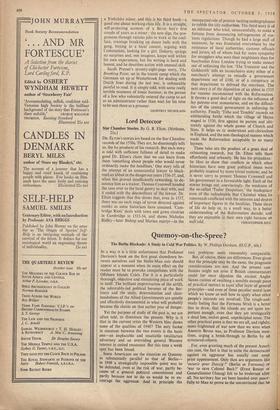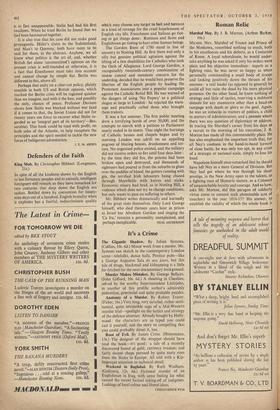Quemoy-on-the-Spree?
The Berlin Blockade: A Study in Cold War Politics. By W. Phillips Davison. (O.U.P., 60s.) IN a way it is a little unfortunate that Professor Davison's book on the first great showdown be- tween ourselves and the Stalin-Mao axis should appear at a moment when its main effect on the reader must be to provoke comparisons with the Offshore Islands Crisis. For it is a particularly thorough, objective and stimulating piece of work in itself. The brilliant improvisation of the airlift, the admirably-led political heroism of the Ber- liners and the unity, determination and clear- headedness of the Allied Governments are quietly and effectively documented in what will probably become ,the classic on that earlier year of danger.
Yet the purpose of study of the past is, we are often told, to illuminate the present. Why is it that in the current crisis the Western bloc shows none of the qualities of 1948? The only factor in common between the two events is the basic one—an implacable and insatiable totalitarian adversary and an overriding general Western interest in united resistance. But this time a weak spot has been found.
Some Americans see the situation on Quemoy as substantially parallel to that of Berlin— in 1948 a strategically impossible point was to be defended, even at the risk of war, partly be- cause of a general political commitment and partly because not to do so would be to en- courage the aggressor. And in principle the two problems seem reasonably comparable.
But, of course, there are differences. Even given that the principle may be the same, the pragmatic considerations are not. And the present con- fusions might not arise if British commentators could for once abandon the ancient Anglo- Saxon custom of swathing a sensible enough piece of practical instinct in layer' after layer of general principles—and even of those peculiar moral laws which we know so well how to apply when other people's interests are involved. The rough-and- ready feeling that the Formosa Strait is a better line to draw, that the islands are not quite im- portant enough, even that they are strategically a dead loss, makes good, unprincipled sense. 'The other practical point is that we are all, and rightly, more frightened of war now than we were when Aneurin Bevan was, as Professor Davison men- tions, urging a break-through to. Berlin by an armoured column.
For, even granting much of the present Ameri- can case, the fact is that to unite the democracies against an aggressor has usually cost some prior appeasement. Only then are arguments like 'mourir pour Danzig ?' (Berlin or Formosa) or 'war to save Colonel Beck?' (Ernst Reuter or Generalissimo Chiang) felt to be irrelevant after all. No territory has yet been handed over peace- fully to Mao to prove to the unconvinced that he
is in fact unappeasable. Stalin had had his first swallows. When he tried Berlin he found that we had been hammered together.
It is also true that his case did not make good propaganda. Hitler's claim to the Sudetenland, and Mao's to Quemoy, both have more to be said for them, in the abstract. Anyhow, we all know what politics is the art of, and, whether British (let alone 'uncommitted') opinion on the present crisis is well-founded or otherwise, it is a fact that Eisenhower must take into account and cannot change by simple fiat. Berlin was different in this, above all.
Perhaps that unity on a clear-cut policy, plainly sensible in both US and British opinion, which marked the Berlin crisis will be regained quicker than we imagine, and with it the best, and possibly the only, chance of peace. Professor Davison shows how Stalin was blocked without war (and if it comes to that, the Soviet Union did not for twenty years use force to recover what Stalin re- garded as an 'integral part of its territory'—Bes- sarabia). This book could be read with profit, on both sides of the Atlantic, to help recapture the principles and the spirit needed to tackle the new focus of belligerent adventurism.
J. E. M. ARDEN



















































 Previous page
Previous page